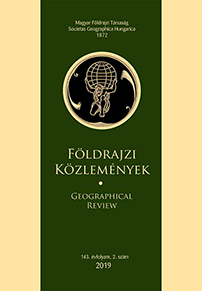Szimbolikus politikai fordulatok és térbeli mintázataik: közterületek átnevezése Budapest I. és V. kerületében
Absztrakt
Az utcák, terek nevei jól látható feliratként mindennapjaink részévé váltak. Segítik a tájékozódást, térbeli hivatkozási pontot nyújtanak, de egyúttal a kollektív emlékezetet tároló fogalmak és politikai eszközök is. Elsődleges funkciójuk a városon belüli eligazítás, másik elemzési aspektusként pedig megjelenik a kulturális, politikai és történeti reprezentáció. Tanulmányomban Budapest I. és V. kerületének köztérnév-hálózatán keresztül arra szeretnék rámutatni, hogy a közterületek nem puszta áramlási csatornák. Egyszerre rögzített helyek is a térben, kölcsönkapcsolatban állva a térhasználókkal és a városszövettel, valamint transzgresszív, dinamikus társadalmi képződmények, melyeknek nem csak fizikai paramétereik, hanem szimbolikus tulajdonságaik is változnak.
Legfőképpen arra szeretnék választ találni, hogy a közterületnevek összefüggéseiből keletkezhetnek-e térbeli mintázatok, illetve hogy egy adott átnevezési hullám esetében ezek milyen mértékig változnak. Fő vizsgálati pontnak szánom az egymást magyarázó utcanévcsoportok megjelenéseit, felszíni kibukkanásukat. Másik kutatási kérdésem, hogy adott átnevezési hullámhoz kapcsolódó kurzusváltás miképp bánik a város múltjával, jelenével.
Copyright (c) 2019 Csaba Baroch

This work is licensed under a Creative Commons Attribution-NonCommercial-NoDerivatives 4.0 International License.



